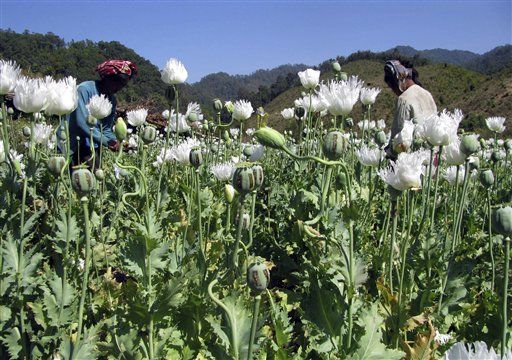Poppy cultivation has rapidly expanded in the Burmese and Laos parts of the Golden Triangle, to feed new demands for heroin, chiefly in China, according to a report released Monday.
“After a decade of decline, Southeast Asia is now once again a major opium growing region,” it claims.
The report said opium production has spread into northern India for the first time, and that chances of a “drug free Asean” by next year are slim at best.
The Transnational Institute (TNI), a Dutch-based NGO active in the region, said in a new 115-page report that new markets in China and India have created fresh demand for heroin. But it noted that cross-the-board attempts to ban opium cultivation have “driven hundreds of thousands of families deeper into poverty”.
One conclusion of this “relapse in the Golden Triangle” is that attempts by China to replicate Thailand’s crop substitution programmes have failed.
Until regional governments and the international community properly addresses poverty, conflict and rising demand for heroin in China, opium bans and eradication will continue to fail,” said Tom Kramer, lead author of the report.
[related]
He echoed his report, saying that crop substitution in the region has so far failed to support farmers forced or attracted back to opium farming.
“Alternative livelihood options need to be firmly in place before communities can be expected to abandon illicit cultivation,” he said.
If the findings of the TNI report are confirmed in coming months, it will mark a major setback for efforts to end the decades-old opium growing and heroin manufacture in areas next to Thailand.
TNI recommended Monday a complete reform of the anti-narcotics policies by all regional governments, up to and including the UN.
Policies must be “more humane, with a focus on health, development and human rights rather than on repression and law enforcement,” the report said.
TNI has long been a leader in calling for such reform, with a strong emphasis on elimination of the death penalty for any type of drug trafficking.
According to the group, the Thai part of the Golden Triangle is not involved in the recent resurgence in poppy production.
Tiny plots used to grow opium poppies in Thailand itself have stayed at around 200 to 300 hectares (1,250 to 1,875 rai), mostly for local consumption and medical use, “opium cultivation … overall has more than doubled from an estimated 24,000 hectares in 2006 to some 58,000 hectares in 2013,” according to the TNI figures.
In Thailand especially, anti-drug measures in recent years have focused mainly on the methamphetamine trade, in an effort to interdict more of the estimated one billion “ya baa” tablets that flow from Burmese pill factories into Thailand.
Almost unnoticed, the opium and heroin revival in the rest of the Golden Triangle, has spread east to India. That was so unexpected that the chief agency involved, the UN Office on Drugs and Crime does not even measure opium production in India.
TNI said that growing regions have shifted in Burma and Laos because local warlords, under central government pressure, banned growing poppies in traditional areas.
The main poppy growing areas in Burma, says the report released Monday, are in the southern Shan State, close to the Thai border. Laos’ production is centered in Phongsali and Houaphan provinces, which border China and Vietnam respectively.
This article was originally published in the Bangkok Post on 2 June 2014.



